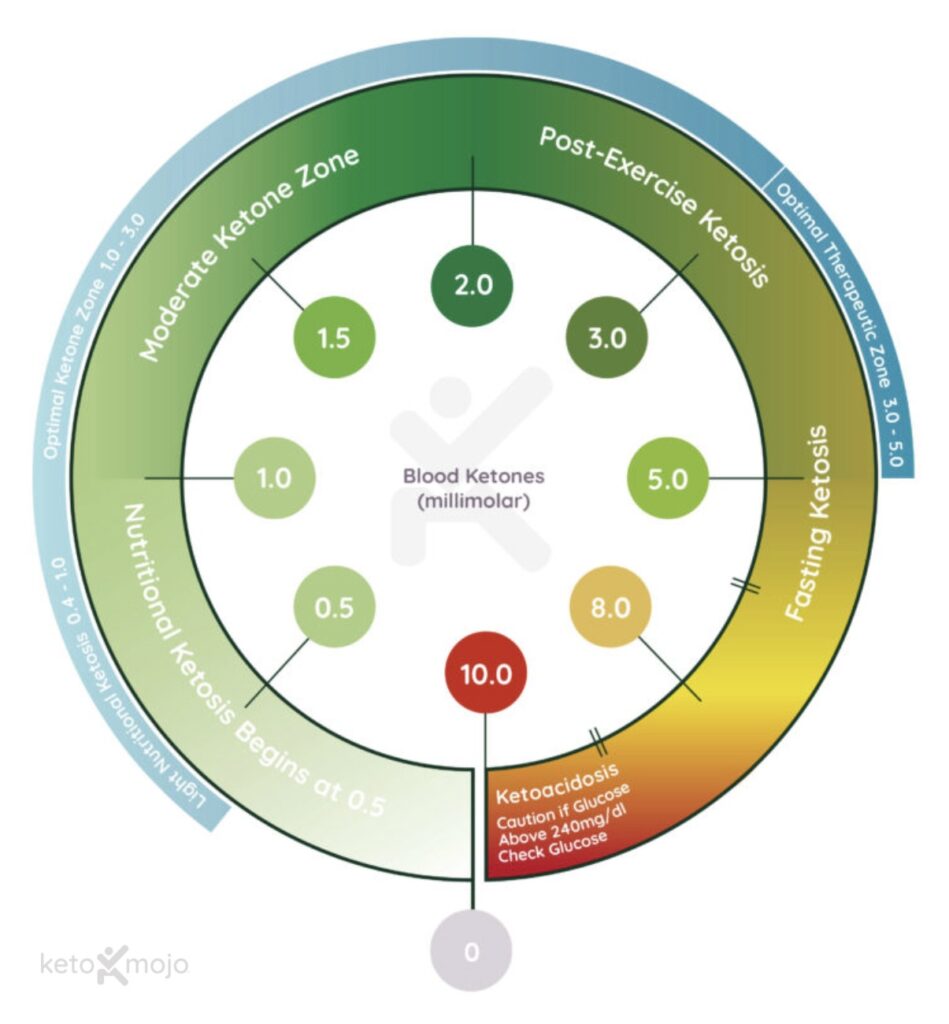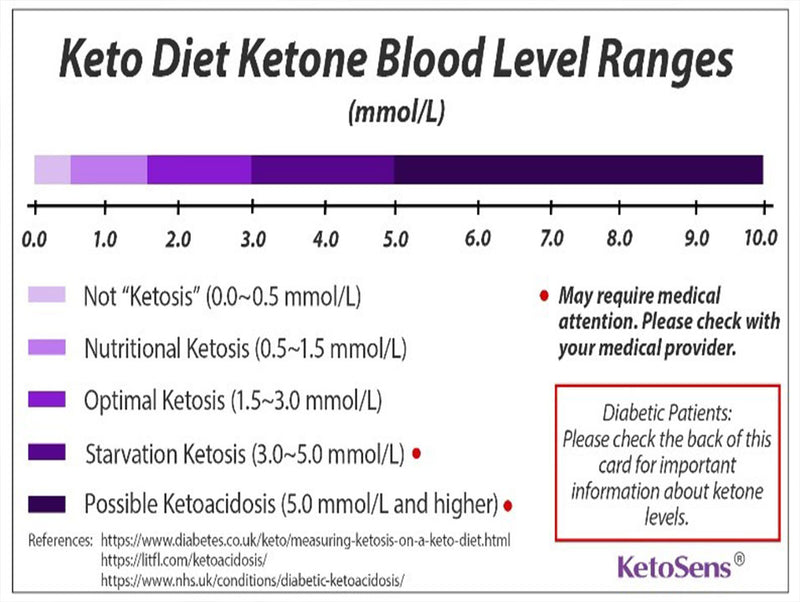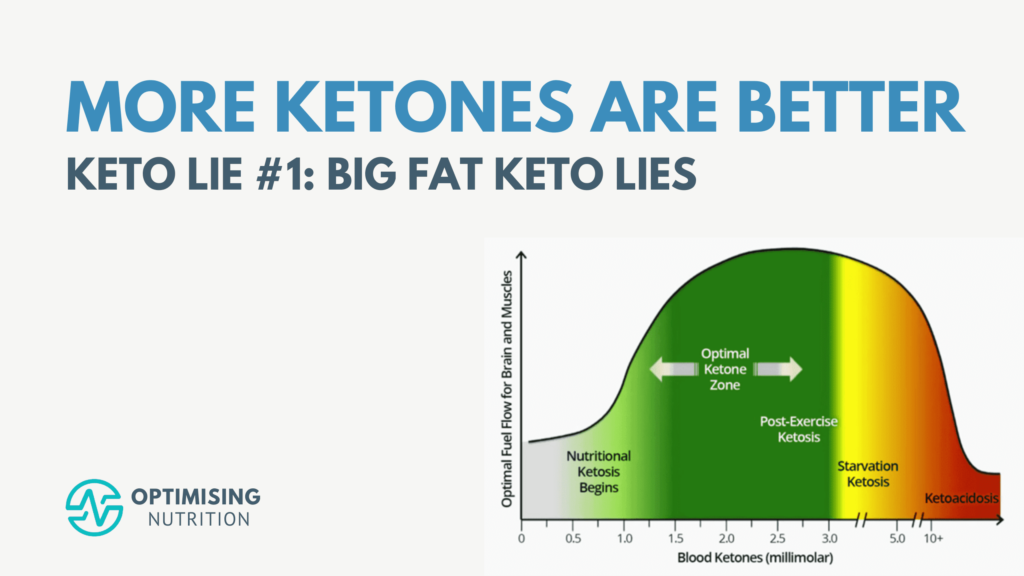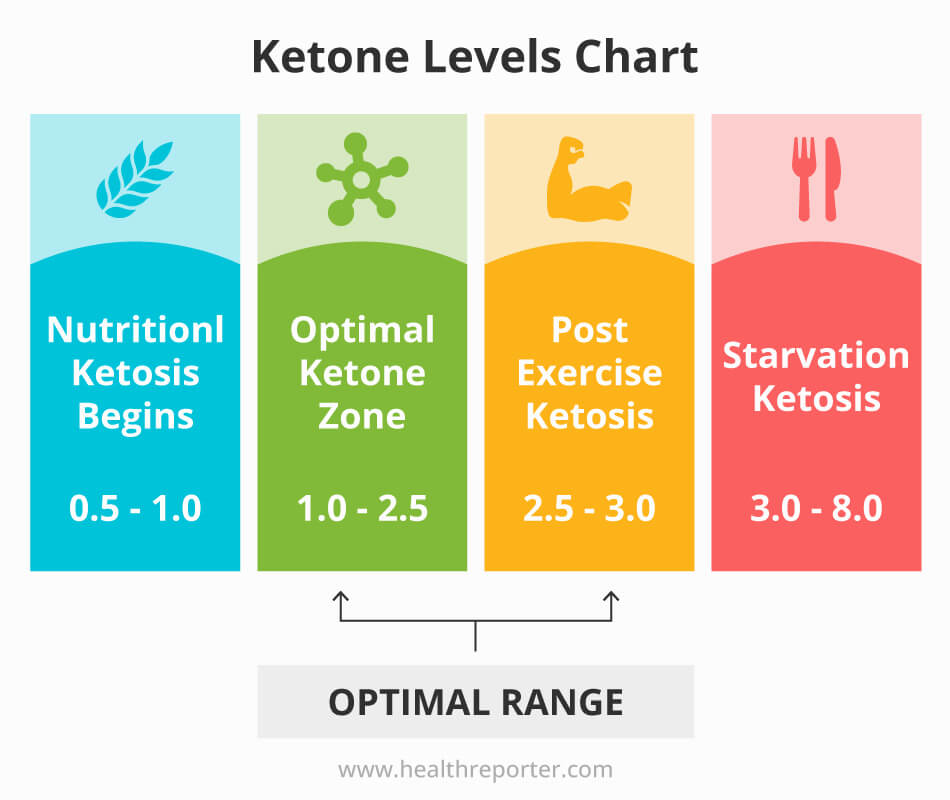
The Optimal Ketone Range for Weight Loss
If you’re looking to shed some pounds and have heard about the ketogenic diet, you may be wondering what the optimal ketone range is for weight loss. Well, the magic number falls between 0.5 and 3 millimoles per liter. Achieving this range requires a significant reduction in carb intake, as being in ketosis is achieved by switching your body’s primary fuel source from carbohydrates to fat. The benefits of being in ketosis are aplenty. Not only can it help improve blood sugar levels and reduce appetite, but it also aids in the preservation of muscle mass, which is crucial for weight loss. It’s important to note that nutritional ketosis is safe for most people and should not be mistaken for ketoacidosis, a dangerous complication of diabetes. While testing your ketone levels isn’t necessary for weight loss, it can offer motivation and encouragement along the way. Whether you choose to use a blood ketone meter, urine test strips, or a breath test, remember that consistency is key. So, grab your measuring device of choice and get ready to track your progress.
Table of Contents
ToggleIntroduction
Welcome to this comprehensive guide on achieving optimal ketone levels for weight loss. If you’re looking to shed those extra pounds and improve your overall health, the ketogenic diet may be just what you need. By following a low-carb, high-fat eating plan, your body will enter a state of ketosis, where it burns fat for fuel instead of carbohydrates. In this article, we’ll delve into the optimal ketone range for weight loss, how to achieve it, and the different methods to measure your ketone levels.
The Optimal Ketone Range for Weight Loss
What is the optimal ketone range for weight loss?
The optimal ketone range for weight loss is typically between 0.5 – 3 millimoles per liter. This range indicates that your body is in a state of ketosis, where it is efficiently burning fat for energy. It’s important to note that individual ketone levels can vary, and what works for one person may not work for another. However, staying within this range is generally considered ideal for weight loss.
Why is the 0.5 – 3 millimoles per liter range important?
When your ketone levels reach the 0.5 – 3 millimoles per liter range, several positive effects on weight loss can occur. Firstly, being in ketosis can help improve blood sugar levels, which is particularly beneficial for individuals with type 2 diabetes or insulin resistance. Additionally, ketosis has been shown to reduce appetite, making it easier to stick to a calorie-restricted diet. Lastly, ketosis helps preserve muscle mass while burning fat, ensuring that the weight you lose comes primarily from stored body fat.
How can achieving this range contribute to weight loss?
It’s essential to achieve the optimal ketone range for weight loss because it signifies that your body has successfully transitioned into a fat-burning state. By following a ketogenic diet and maintaining this range, you can expect sustainable weight loss over time. Furthermore, being in ketosis can also lead to improved mental clarity, increased energy levels, and better overall health.
Achieving Optimal Ketone Levels
Significantly reducing carb intake
The primary way to achieve optimal ketone levels for weight loss is to significantly reduce your carbohydrate intake. On a standard ketogenic diet, it is recommended to keep your carb intake below 50 grams per day. By limiting your carb consumption, your body will enter a state of ketosis more efficiently, maximizing the fat-burning potential.
Understanding the difference between ketosis and ketoacidosis
Before embarking on a ketogenic diet, it’s important to differentiate between nutritional ketosis and ketoacidosis. Nutritional ketosis, which occurs during a properly followed ketogenic diet, is a safe metabolic state for most individuals. On the other hand, ketoacidosis is a potentially life-threatening condition that occurs in individuals with uncontrolled diabetes. It is crucial to monitor your overall health and consult with a healthcare professional before starting any new diet, especially if you have preexisting medical conditions.
Restricting carb intake to less than 50 grams per day
To achieve optimal ketone levels, it’s necessary to restrict your daily carbohydrate intake to less than 50 grams. This can seem challenging initially, as many common foods and beverages contain hidden carbohydrates. However, focusing on whole, unprocessed foods such as meats, fish, eggs, non-starchy vegetables, and healthy fats will help you stay within your carb limit. Additionally, tracking your daily food intake using a mobile app or food diary can provide invaluable guidance in controlling your carb consumption.
Measuring Ketone Levels
Methods to measure ketone levels
There are several methods available to measure your ketone levels. The most accurate and reliable method is using a blood ketone meter, which measures the concentration of ketones in your blood. Another option is urine test strips, which detect the presence of ketones in your urine. Lastly, breath tests measure the acetone levels in your breath, which indicates the production of ketones.
Is testing necessary for weight loss?
While testing your ketone levels is not necessary for weight loss on the keto diet, it can be beneficial for tracking your progress and providing motivation. The results can serve as positive reinforcement, proving that your body is successfully in ketosis and burning fat for fuel. However, it’s important to note that the number on the ketone meter is not the sole determinant of weight loss success. Consistently following a properly formulated ketogenic diet and creating a calorie deficit are the key factors in achieving weight loss.
Optimal timing for testing ketone levels
The optimal time to test your ketone levels is typically 3 hours after a meal. This timing allows your body enough time to metabolize the food and enter a stable ketotic state. By consistently testing at the same time each day, you can gather reliable data on your ketone levels and track any changes over time.
Comparing the accuracy of different measurement methods
The most accurate method to measure ketone levels is with a blood ketone meter. This device provides a precise reading of the ketone concentration in your bloodstream. Urine test strips, while less accurate, can still offer a general indication of your ketone production. However, breath tests are generally considered the least accurate method, as they measure acetone levels which may not correlate directly with blood ketone levels.
Frequency of testing ketone levels
It’s unnecessary to test your ketone levels daily, as long as you consistently follow the ketogenic diet guidelines. However, it can be beneficial to test for a few days after starting the diet to ensure that you have successfully entered ketosis. Additionally, periodic testing can provide reassurance and help you adjust your diet if necessary. Remember, the goal is to maintain optimal ketone levels within the recommended range consistently.
Exogenous Ketone Supplements
Effect of exogenous ketone supplements on ketone levels
Exogenous ketone supplements are gaining popularity among individuals following a ketogenic diet. These supplements come in various forms, including powders, drinks, and capsules, and they provide an external source of ketones that can increase your ketone levels. However, it’s important to note that while exogenous ketones can temporarily raise your ketone levels, they may not necessarily lead to enhanced weight loss.
Uncertainty regarding their impact on weight loss
The use of exogenous ketone supplements for weight loss is still a topic of debate and research. While these supplements may have benefits such as increased mental focus and improved physical performance, their direct impact on weight loss is uncertain. It’s essential to understand that the key to weight loss on a ketogenic diet lies in achieving a state of endogenous ketosis through diet and lifestyle choices, rather than relying solely on exogenous ketone supplements.
In conclusion, achieving optimal ketone levels within the 0.5 – 3 millimoles per liter range is crucial for weight loss success on a ketogenic diet. By significantly reducing carbohydrate intake, understanding the difference between ketosis and ketoacidosis, and monitoring your ketone levels using various measurement methods, you can maximize your chances of reaching your weight loss goals. While exogenous ketone supplements may temporarily elevate ketone levels, their impact on weight loss is uncertain. Remember, it’s the combination of a well-formulated ketogenic diet and a sustainable lifestyle that will ultimately lead to successful and lasting weight loss. So, embrace this new way of eating, monitor your progress, and enjoy the journey to a healthier, leaner you!
Discover the optimal ketone range for weight loss and how to achieve it. Get all the information you need to track your progress and reach your goals.




